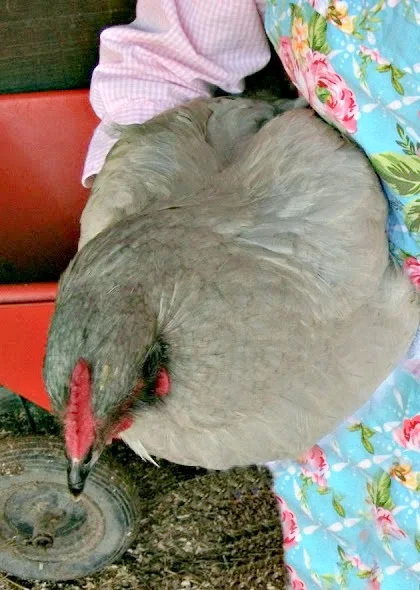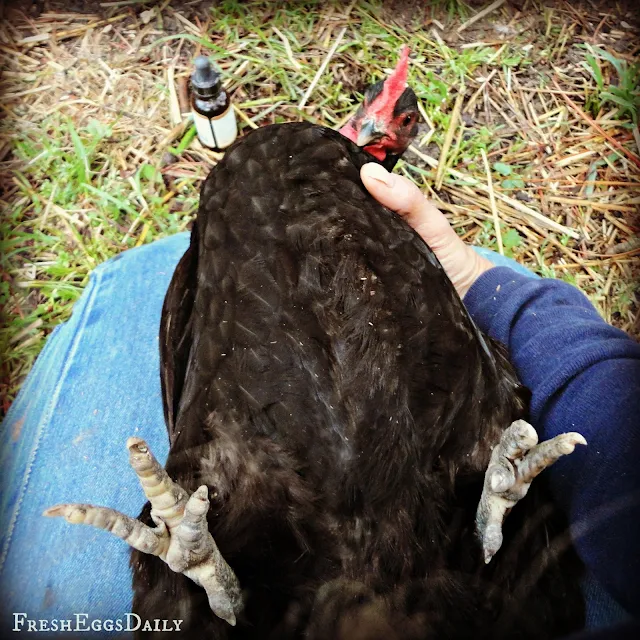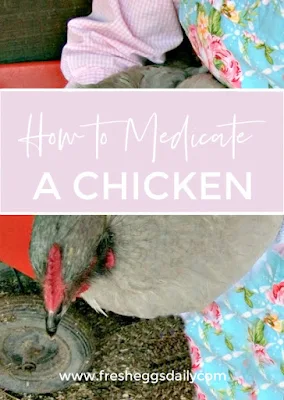How to Administer Medication to a Chicken
Administering medication to a chicken isn't easy no matter which way you look at it.
No matter how friendly your hens are, or how much you handle them and they love to sit in your lap, they seem to have a sixth sense, and as soon as you try to administer medication, they turn into squirming, wing-flapping dervishes.
That's why it's so important to get your chickens used to being patted and held right from the start. You might get away with sitting and holding your ailing hen, petting her and then quickly opening her mouth and dripping drops into her mouth once or twice, but by day three, good luck even catching her.
Obviously chasing a sick chicken around isn't optimal - either for her or for you, since you want to keep her calm - and many times even in isolation she will manage to squirm and evade your best efforts.
Often a very sick chicken will hold still, but as soon as she begins to feel the slightest bit better, she might still be needing medication but will be much more feisty and harder to hold.
Here are some tips to help you the next time you need to medicate your chickens...so easy that you can handle it yourself (I mean, I even managed to hold the camera at the same time with my free hand!)
How to Administer Medication to a Chicken
Oral Medication for Chickens
Many medications need to be administered orally using an eyedropper, but you need to be very, very careful not to let the liquid go down the windpipe (also called the glottis) which can cause the hen to aspirate and possibly die. The glottis is located at the back of the tongue of the chicken.
There is also a hole further back which goes to the crop and digestive system, and that's where the liquid needs to go.
That means pushing the eyedropper further down the throat which isn't pleasant for the patient.
Alternatively, you can drip the liquid at the very front of the beak on the tip of the tongue.
But, if that's not working, instead dripping the medication onto the roof of a chicken's mouth is far safer. Although there is a third hole in the chicken's mouth - this one on the roof of her mouth - that goes to her sinuses, it's easier to avoid.
Flip her Over
For drops that need to be administered by mouth, such as Nutri-Drench, kneeling on the ground, hold your chicken around the middle keeping her wings against her body, flip her over and place her on your knees. This also keeps her wings stable and from flapping all over the place.
If you're giving the medicine by yourself, this is probably the easiest way to do it.
While you hold the chicken securely between your legs, with the fingers of one hand, very gently press each side of her beak near the hinge until she opens up her mouth and then tip her head up and drip the drops in with an eyedropper or syringe with your free hand onto the roof of her mouth, avoiding the small hole.
Dab under the Wings
VetRX, which is an all-natural cure for respiratory issues and probably the medication I use most, can be administered by mouth, via drinking water or under the wing.
I find that a few drops under the wing can be applied quickly and easily, usually without your chicken even realizing she's being treated.
Just kneel down, hold your chicken in place with one hand, and use the fingers of that hand to raise her wing. Apply the drops with the other hand.
Q-tip to the Nostrils
VetRX can also be administered by dabbing a bit on each nostril. Kneeling and holding your chicken between your knees, petting her with one hand while dabbing each nostril with a VetRX-drenched q-tip is simple and will fool even the most suspicious patient.
Add Drops to Drinking Water
Since all of the remedies I use are natural and holistic, I can just add a few drops of essential oil or medication to my flock's drinking water.
They won't hurt the healthy hens in the last bit, but their effects will also benefit any ailing hens.
If you're not sure if they are drinking, hold the hen and dip her beak into a small dish of water/medication, as well as adding the medication to the general population drinking water.
Handle your Hens Often
Since I make it a point to pick up each of my chickens on a regular basis, giving my chickens regular checkups, walking around carrying them, examining their eyes, vents, feet, etc. and petting them often, I can easily grab one and medicate her before she even realizes this isn't is regular petting session.
This is very important especially when you have an injured hen that she is comfortable being held.
I hope that these few simple tips will help next time you need to administer any medication.
These articles might also be of interest to you:



























